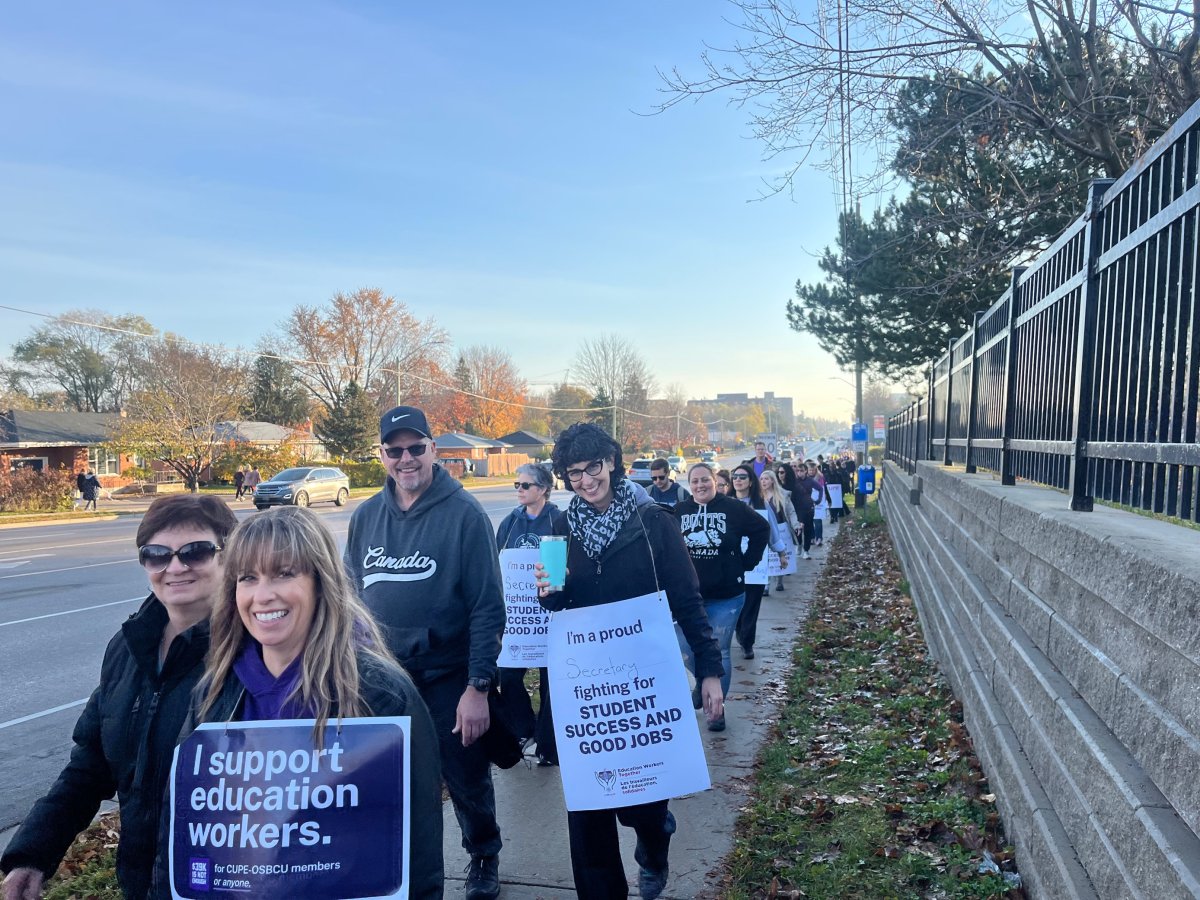Despite newly passed legislation banning the Canadian Union of Public Employees (CUPE) from walking off the job, hundreds of education workers and supporters woke up at the crack of dawn on Friday to hit the picket lines outside politicians’ offices across London, Ont.

At NDP MPP Peggy Sattler’s office at 240 Commissioners Rd. W., Mary Henry, president of CUPE 4222, said there was a “full show” of people waiting to sign up at 7:30 a.m.
“It’s overwhelming, but it beats my heart,” she told Global News, commenting on the attitude of supporters. “Everyone is very positive, upbeat, and they’re nervous, absolutely. But we are confident, and we are standing together.”
On Wednesday evening, Ontario’s Progressive Conservative government enacted a law, Bill 28 or the Keep Students in School Act, imposing contracts on 55,000 CUPE education workers and announced that it would be illegal for them to strike, using the notwithstanding clause to “protect against constitutional challenges.”
According to the legislation, those protesting could received fines of up to $4,000 per employee per day. There are fines of up to $500,000 for the union who also said they would “foot the bill” for fines against workers which could cost them as much as $220 million daily.
CUPE said the law is an attack on all workers’ bargaining rights and staged the work stoppage anyways, referring to it as a political protest and warning the government that it will likely last beyond Friday.
“With pretty much everything that the government’s been doing and the way they’ve been sneaking around and misusing the laws and legislation, it’s very annoying,” Henry said. “It makes you more determined to stand your ground and that’s exactly what we’re doing and seeing here and everywhere across the province.”
“The government has pretty much ignored us, excluded us and treated us like crap, and the members are feeling it,” Henry continued. “This is a means of survival that we’re trying to get people to understand.”
Following the passing of Bill 28, CUPE announced that it additionally plan to fight the fines, but if the union has to pay, it will pay. Some of the union’s leaders have previously suggested that CUPE is also looking for financial help from outside labour groups.
Averaging around $39,000 according to the union, CUPE said its workers are some of the lowest paid in schools and had been seeking annual salary increases of 11.7 per cent, overtime at twice the regular pay rate, and 30 minutes of paid prep time per day for educational workers and ECEs.

Get daily National news
The government’s latest offer, which was legally pressed on union workers, gives employees earning less than $43,000 a 2.5 per cent salary increase per year. Those earning above $43,000 now receive a 1.5 per cent yearly increase in pay.
Sherene Rogers, an Early Child Educator (ECE) and member of CUPE, echoed the union’s push for a substantial increase in workers wages, saying “fighting for what’s deserved” is what’s driving her to strike.
“Inflation is at the highest, and some of my colleagues are working three, four jobs and a full-time job to just make ends meet. So, we’re clearly fighting for what we deserve,” she said.
Commenting on the government’s use of the notwithstanding clause, Rogers said she feels like education workers have been “shafted.”
“They take us like we’re below them and it’s unfortunate that I have to come out here at 7:30 in the morning to fight for what I believe is right,” she explained.
The Ontario Public Service Employees Union (OPSEU) said earlier this week that 8,000 education workers will also walk off the job on Friday in solidarity with CUPE workers. The Labourers’ International Union of North America has also expressed solidarity.
“I can definitely feel for them, and I know how much they mean to teachers,” said Eric Bois, a teacher with the Thames Valley District School Board (TVDSB) and an Elementary Teachers Federation of Ontario (ETFO) member. “We can’t do our job without them. It is a team effort so, we’re here to support them.
“We haven’t had our vote yet, but we will be in the same situation next week,” he added.
As teacher’s contracts expired earlier this summer, ETFO will have its own strike vote next week as the president said that families are “not willing to accept more cuts on public education.”
Bois said that the way the Ford government has been handling negotiations with CUPE is worrisome.
“It’s very concerning as we live in Canada, it’s a democratic country,” he said. “Unions should have that right to get out and strike, to have their voices heard, so I’m very upset with the government’s decision.”
Both TVDSB and London District Catholic School Board (LDCSB) announced Thursday that their schools will be closed on Friday following the confirmed news of the walkout. Students will learn from home in independent and remote learning for the time being.
However, the Conseil Scolaire Viamonde School Board kept it’s four French schools in London open on the first day of the strike.
“We’re here for the children, and we want the best for them,” Rogers said. “But sometimes we feel that we’ve been disrespected. So, once again, that’s why we’re here fighting for what we believe and what we deserve.”
According to the school boards, CUPE represents roughly 2,500 full-time and 1,000 casual staff within TVDSB, and approximately 1,300 staff within LDCSB.
Going back to Henry, she said that “today is just peaceful protests and we’re just making sure that everybody is aware that we are here. We will be heard, and we will continue to fight and stand up for our rights.”
— With files from Global News’ Andrew Graham, Matthew Trevithick and The Canadian Press.














Comments